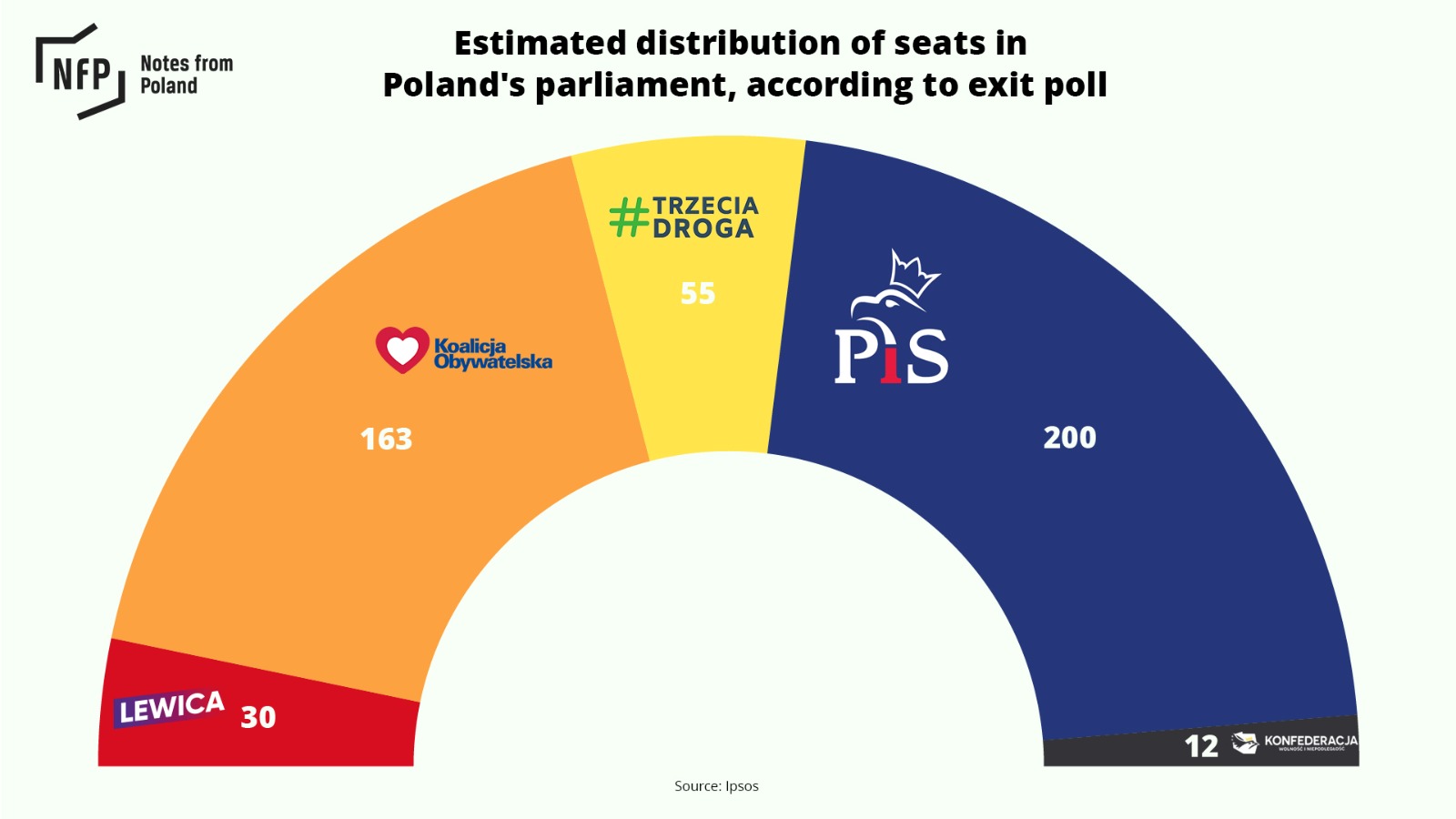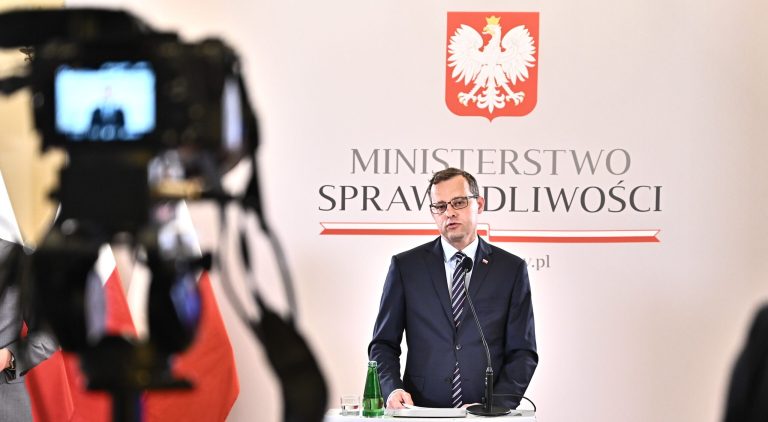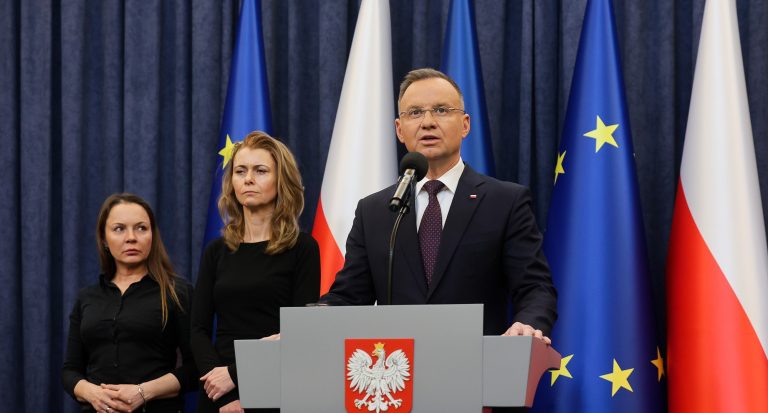Exit poll: ruling party win Poland’s election but opposition government more likely

The exit poll for today’s parliamentary elections in Poland indicates that the ruling national-conservative Law and Justice (PiS) has, as expected, won the largest share of the vote, with 36.8%.
However, if that vote share is confirmed in the official results – which are due to be announced by Tuesday – it is almost certain not to be enough to secure the governing majority PiS needs to remain in power for an unprecedented third term.
The centrist Civic Coalition (KO) is in second with 31.6%. Its potential partners in forming a new coalition government, the centre-right Third Way (13%) and The Left (8.6%), are third and fourth respectively, according to the exit poll, which was conducted by Ipsos.
The far-right Confederation (Konfederacja) is fifth with 6.2% – a much lower result than previous polls have suggested.
Ipsos calculates, based on the exit poll, that PiS will win 200 seats in the Sejm, the more powerful 460-seat lower house of parliament. That is well short of a majority, even were it form an alliance with Confederation, which is predicted to win 11 seats.
However, KO (163 predicted seats), Third Way (55) and The Left (30) would have a combined 248 seats, according to Ipsos’s estimates. That would allow them to form a government.

The exit poll was conducted at 900 randomly selected polling stations with a sample of around 90,000 people, far larger than normal opinion polls, which usually have a sample of around 1,000 respondents. At the last parliamentary elections in 2019, the exit poll – also conducted by Ipsos – was very close to the official results.
Its findings relate to the elections to the more powerful Sejm, the lower house of parliament. Today also saw elections for the weaker upper-house Senate and a national referendum called by the government.
To enter the Sejm, groups standing as coalitions (in this case, KO and Third Way) must win at least 8% of the vote nationally. For groups standing as parties (PiS, The Left and Confederation), the threshold is 5%.
Following reports that some polling station staff have been asking voters if they want ballots for both the parliamentary election and referendum – which are taking place simultaneously – the electoral commission has declared that this should not be done https://t.co/S7GiSAg383
— Notes from Poland 🇵🇱 (@notesfrompoland) October 15, 2023
The close of voting today marked the end of a heated, often bitter campaign. But it may also mark the start of weeks, and perhaps months, of uncertainty and horsetrading over the formation of a new government.
Should it prove impossible to form one – or should a new administration prove unstable – it is possible that Poles will be asked to go to the polls again in a new election.
Once the official results of the elections are confirmed, President Andrzej Duda must call a first session of the newly elected parliament within 30 days of the elections and he also designates a prime minister.
Polling suggests Poland’s coming parliamentary election will be very close, with possibility of no clear majority.
The timetable of events after Sunday’s vote will be important, with the president playing a crucial role.
A brief guide on what to expect [THREAD]:
— Stanley Bill (@StanleySBill) October 13, 2023
Traditionally, the president’s choice is a figure from the largest party, which appears likely to be PiS. Duda is also a former member of PiS and has generally been an ally of the PiS government since it came to power in 2015, shortly after he was himself elected as president.
The designated prime minister then proposes a government, which is appointed by the president. It then presents a programme and a vote of confidence is held in the Sejm, the more powerful lower house of parliament.
If a majority in the chamber votes in favour of the new government, then the process is complete. If not, parliament seeks to pick a new candidate for prime minister and hold a new vote of confidence in their proposed government.
If that fails, the president has another chance to propose a prime minister. Should that final attempt fail, the president must dissolve parliament and call new elections within 45 days.
Sunday’s elections are above all a clash between two parties, PiS and PO, that have ruled Poland for the last 18 years
We have prepared 21 charts showing Poland’s economic, social and democratic progress over that time.
Click here to see them all 👇https://t.co/rA5nIT8pv7
— Notes from Poland 🇵🇱 (@notesfrompoland) October 9, 2023
How – and how far – the above constitutional process proceeds will depend to a large extent on the final distribution of seats when election results are announced tomorrow or on Tuesday.
If, as appears likely, PiS is the largest party but lacks a majority, it will have the first shot at forming a government but may struggle to do so, given a lack of obvious coalition partners. If, however, it is close to a majority, it could try to tempt some individual MPs from other groups to switch allegiance.
If the mainstream opposition groups – KO, The Left and Third Way – have a combined majority, then they are likely to be able to form a government – though they will probably have to wait until after Duda first gives PiS, as the largest party, a chance to do so.
If neither PiS nor the mainstream opposition has a majority, then Confederation will hold the balance of power. The nationalists have long insisted they will not enter a coalition with either side.
The far-right Confederation is now running third in the polls with double-digit support.
That raises the likelihood of it holding the balance of power after this year’s elections and has led to renewed scrutiny of the views of its young new leader https://t.co/jrC2mmxENi
— Notes from Poland 🇵🇱 (@notesfrompoland) April 2, 2023
However, analysts have suggested that a “confidence and supply” arrangement – whereby Confederation agrees to support, but not join, a minority government in return for some concessions – could be possible.
But if no such agreement can be reached – or if any such arrangement proves unstable and unsustainable – then new elections may have to be called.
A final potential factor is that the Supreme Court must declare the elections to have been valid or not within 90 days of them taking place. The chamber of the court empowered to do this was created as part of the PiS government’s contested judicial reforms and contains judges nominated by another overhauled body.
The European Court of Human Rights has ruled that the Supreme Court chamber is not an “independent and impartial tribunal established by law and that the body nominating judges is “unduly influenced by the legislative and executive powers”.
If the Supreme Court’s chamber rules that there have been irregularities in the conduct of the elections, it can order them to be repeated in whole or in part.
The @ECHR_CEDH has ruled that two Polish judges had their right to a fair hearing breached by a review body created during Poland’s overhaul of the judiciary.
The justice minister called the verdict part of a „broader political action” against the countryhttps://t.co/4E4e3CVs5u
— Notes from Poland 🇵🇱 (@notesfrompoland) November 8, 2021

Notes from Poland is run by a small editorial team and published by an independent, non-profit foundation that is funded through donations from our readers. We cannot do what we do without your support.
Main image credit: Slawomir Kaminski / Agencja Wyborcza.pl

Daniel Tilles is editor-in-chief of Notes from Poland. He has written on Polish affairs for a wide range of publications, including Foreign Policy, POLITICO Europe, EUobserver and Dziennik Gazeta Prawna.






